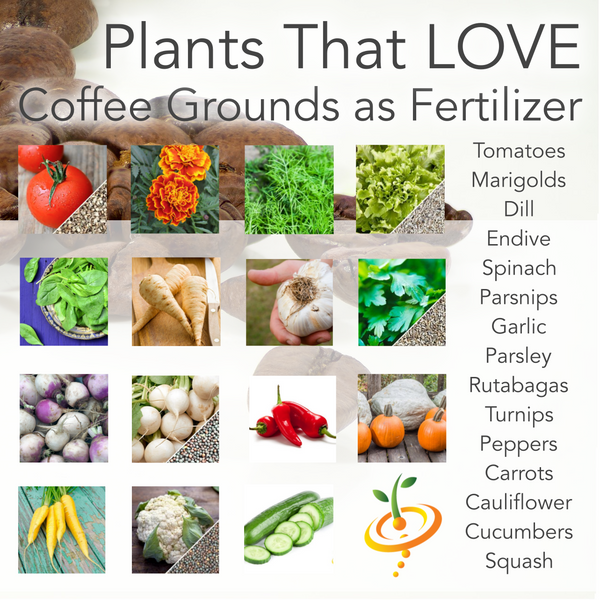What Plants Like Coffee Grounds: Top Picks for Gardeners

What plants like coffee grounds blueberries, azaleas, and roses thrive with coffee grounds. They benefit from the acidic environment created by used coffee grounds.
Coffee grounds are a rich source of nutrients and organic material for plants. They contain nitrogen, potassium, and phosphorus, which are vital for plant growth. Many acid-loving plants, like blueberries, azaleas, and roses, benefit from the slightly acidic pH of coffee grounds.
These grounds also improve soil structure by adding organic matter, enhancing its water retention capacity. Coffee grounds can deter pests and attract beneficial worms. Always use coffee grounds in moderation to avoid over-acidifying the soil. Mix them into compost or soil for the best results, and watch your garden flourish with this natural, eco-friendly fertilizer.
Introduction To Coffee Grounds In Gardening
Coffee grounds are a favorite for many gardeners. They are easy to get and use. Many plants love coffee grounds. They help plants grow strong and healthy. This guide will show you how to use coffee grounds. You will learn the benefits and tips for safe use.
Benefits For Soil
Coffee grounds are great for the soil. They add nutrients that plants need. Here are some key benefits:
- Rich in nitrogen: Helps plants grow.
- Improves drainage: Makes soil less compact.
- Increases water retention: Keeps soil moist longer.
- Attracts worms: They help improve soil quality.
These benefits make coffee grounds valuable in the garden. They can turn poor soil into rich, fertile ground.
Precautions And Tips
While coffee grounds are good, use them carefully. Here are some tips:
- Don’t use too much. A little goes a long way.
- Mix grounds with other compost materials.
- Let coffee grounds dry before using them.
- Avoid using on seedlings. They are too delicate.
Following these tips will ensure your plants stay healthy. It helps avoid any potential problems.
Acid-loving Plants And Coffee Grounds
Coffee grounds are a fantastic addition to your garden. They are particularly beneficial for acid-loving plants. These plants thrive in acidic soil, and coffee grounds help maintain the right pH level. Here are some popular acid-loving plants that benefit from coffee grounds.
Azaleas
Azaleas love acidic soil. Sprinkling coffee grounds around these plants can help them flourish. The grounds provide essential nutrients like nitrogen, which promote healthy growth. Azaleas with coffee grounds often have brighter blooms and stronger roots.
Rhododendrons
Rhododendrons also thrive in acidic environments. Coffee grounds can be a great addition to their soil. The grounds improve soil structure and aeration. This helps the roots absorb nutrients more efficiently. Rhododendrons with coffee grounds often show improved vitality.
Camellias
Camellias are another group of plants that love acidity. Using coffee grounds can enhance their growth. The grounds provide a slow-release source of nitrogen. This promotes lush, green foliage and abundant flowers. Camellias with coffee grounds are usually more robust and resilient.
| Plant | Benefits of Coffee Grounds |
|---|---|
| Azaleas | Brighter blooms, stronger roots |
| Rhododendrons | Improved vitality, better nutrient absorption |
| Camellias | Lush foliage, abundant flowers |
Using coffee grounds can be a simple way to boost your garden’s health. Especially for plants that love acidic soil, the benefits are clear. Try adding coffee grounds to your azaleas, rhododendrons, and camellias. Watch them thrive and brighten your garden.
Vegetables That Thrive With Coffee Grounds
Using coffee grounds in your garden can benefit many vegetables. Coffee grounds add nutrients and improve soil structure. They can also deter pests. Below are some vegetables that thrive with coffee grounds.
Tomatoes
Tomatoes love the nutrients in coffee grounds. The grounds provide nitrogen, which helps tomatoes grow strong. Mix coffee grounds into the soil around your tomato plants. This will give them a nutrient boost. Coffee grounds can also keep pests away from your tomatoes.
Carrots
Carrots grow well with coffee grounds too. The grounds help to loosen the soil. This makes it easier for carrots to grow straight and long. Sprinkle coffee grounds over the soil before planting carrot seeds. Your carrots will grow better and healthier.
Radishes
Radishes benefit from coffee grounds in the soil. The nutrients in the grounds help radishes grow faster. Mix coffee grounds into the soil before planting your radish seeds. This will improve the growth and taste of your radishes. Coffee grounds also help keep pests away from radishes.
Flowering Plants And Coffee Grounds Compatibility
Coffee grounds can be a great addition to your garden. They provide nutrients and improve soil structure. Flowering plants particularly benefit from this organic matter. Here’s a look at some flowering plants that thrive with coffee grounds.
Hydrangeas
Hydrangeas love acidic soil. Coffee grounds can help lower soil pH. This makes the flowers bloom more vibrantly. Spread coffee grounds around the base of the plant. Mix them into the top layer of soil. Water well to activate the nutrients.
Roses
Roses benefit greatly from the nitrogen in coffee grounds. Nitrogen promotes healthy leaf growth and strong stems. Sprinkle coffee grounds around the rose bush. Work them into the soil gently. This helps the nutrients reach the roots.
African Violets
African Violets thrive in slightly acidic soil. Coffee grounds can help achieve this balance. Use coffee grounds sparingly as a top dressing. Mix them into the soil to avoid mold growth. Your African Violets will thank you with vibrant blooms.
| Flowering Plant | Soil pH Preference | Benefits of Coffee Grounds |
|---|---|---|
| Hydrangeas | Acidic | Improves flower color |
| Roses | Slightly Acidic | Boosts leaf growth |
| African Violets | Slightly Acidic | Enhances bloom quality |
Using coffee grounds can help your flowering plants flourish. They provide essential nutrients and improve soil structure. Always remember to use them in moderation.
Coffee Grounds For Herb Gardens
Using coffee grounds in your herb garden can boost plant growth. Coffee grounds are rich in nitrogen, which helps herbs grow strong. They also improve soil structure and drainage.
Let’s explore how coffee grounds benefit specific herbs:
Basil
Basil loves nitrogen, making coffee grounds perfect for it. Sprinkle a thin layer of coffee grounds around the basil plant. This will enrich the soil and keep it moist. Ensure the layer is thin to avoid mold growth.
Cilantro
Cilantro also benefits from the nitrogen in coffee grounds. Mix coffee grounds into the soil before planting cilantro. This will help the herb grow faster and healthier. Avoid overusing coffee grounds, as cilantro prefers slightly acidic soil.
Parsley
Parsley thrives with the help of coffee grounds. Add coffee grounds to the soil around parsley plants. This will provide essential nutrients and improve soil texture. Like other herbs, parsley needs a balanced amount of coffee grounds.
| Herb | Benefits of Coffee Grounds | Usage Tips |
|---|---|---|
| Basil | Rich in nitrogen, keeps soil moist | Thin layer, avoid mold |
| Cilantro | Boosts growth, adds nutrients | Mix into soil, avoid overuse |
| Parsley | Improves soil texture, adds nutrients | Balanced amount, avoid clumps |
Using coffee grounds in your herb garden is a natural way to enrich the soil. Remember to use them sparingly for the best results.
Fruit-bearing Plants And Coffee Grounds
Fruit-bearing plants love coffee grounds. They get nutrients like nitrogen, potassium, and phosphorus. These nutrients help the plants grow and produce more fruit. Below are some fruit-bearing plants that thrive with coffee grounds.
Blueberries
Blueberries thrive in acidic soil. Coffee grounds make the soil more acidic. This helps blueberries grow better. Sprinkle coffee grounds around the base of your blueberry plants. Mix them into the soil gently. Do this once a month for best results.
Strawberries
Strawberries also benefit from coffee grounds. The nitrogen in coffee grounds helps the plants grow. The acidity improves the soil for strawberries. Spread coffee grounds around the base of the strawberry plants. Mix them into the top layer of soil.
Raspberry Bushes
Raspberry bushes love coffee grounds too. They need nutrients to grow strong. Coffee grounds provide those nutrients. Spread coffee grounds around the base of the raspberry bushes. Mix them into the soil. Do this every few weeks.
| Fruit-Bearing Plant | Benefits of Coffee Grounds |
|---|---|
| Blueberries | Increases soil acidity, provides essential nutrients |
| Strawberries | Improves soil acidity, supplies nitrogen |
| Raspberry Bushes | Provides vital nutrients, enhances soil quality |
The Impact Of Coffee Grounds On Soil Organisms
Coffee grounds can boost soil health. They enrich the soil with nutrients. They also affect the organisms living in the soil.
Earthworms
Earthworms love coffee grounds. These grounds improve their habitat. Earthworms break down organic matter faster. This process enriches the soil.
| Benefit | Description |
|---|---|
| Improved Habitat | Earthworms thrive in soil with coffee grounds. |
| Increased Activity | They break down organic matter more quickly. |
Soil Bacteria And Fungi
Coffee grounds provide food for soil bacteria and fungi. These microorganisms are essential for soil health. They break down organic materials, releasing nutrients.
- Rich Nutrients: Coffee grounds contain nitrogen, which bacteria need.
- Improved Soil Structure: Fungi help bind soil particles together.
The activity of bacteria and fungi improves soil fertility. Healthy soil supports plant growth better.
Creative Uses Of Coffee Grounds In Garden Landscaping
Coffee grounds are not just waste. They can be a gardener’s best friend. These grounds enrich the soil and help plants thrive. Here are some creative uses of coffee grounds in your garden landscape.
As A Mulch
Using coffee grounds as mulch can benefit your garden. Mulch helps retain soil moisture. It also reduces weed growth. Spread a thin layer of coffee grounds around your plants. Make sure the layer is not too thick. This will prevent mold and fungus. Coffee grounds also add nutrients to the soil.
In Compost
Coffee grounds are excellent for composting. They are rich in nitrogen. This helps speed up the decomposition process. Mix coffee grounds with other compost materials. Balance them with brown materials like leaves and paper. This creates a nutrient-rich compost for your garden.
| Green Materials | Brown Materials |
|---|---|
| Coffee Grounds | Dry Leaves |
| Vegetable Scraps | Paper |
| Grass Clippings | Sawdust |
Natural Pest Repellent
Coffee grounds can also be a natural pest repellent. They deter pests like slugs and snails. Sprinkle coffee grounds around your plants. This creates a barrier that pests avoid. Coffee grounds can also repel ants and other small insects.
- Slugs
- Snails
- Ants
Common Questions About Coffee Grounds In Gardening
Using coffee grounds in gardening is a popular topic. Many gardeners have questions about it. Below, we address some common queries.
Frequency Of Application
How often should you use coffee grounds? Use them sparingly. Too much can harm plants.
- Monthly application is ideal for most plants.
- Weekly use may be too much.
- Observe your plants for any changes.
Fresh Vs. Used Grounds
Should you use fresh or used grounds? Both have benefits.
| Type | Benefits | Considerations |
|---|---|---|
| Fresh Grounds | Rich in nitrogen | Can be too acidic |
| Used Grounds | Less acidic | Still provide nutrients |
Choose based on your plant’s needs. Used grounds are safer for most plants.
Potential Plant Risks
Are there risks with using coffee grounds? Yes, there are.
- Excessive use can lead to soil acidity.
- Mold growth if not mixed well.
- Attracting pests like ants.
Monitor your garden. Make adjustments as needed. Coffee grounds are a great addition when used correctly.
Frequently Asked Questions
What Plants Should I Not Put Coffee Grounds On?
Avoid using coffee grounds on plants like tomatoes, clovers, and alfalfa. These plants dislike the acidity. Use coffee grounds sparingly on other plants.
What Plant Benefits Most From Coffee Grounds?
Acid-loving plants benefit most from coffee grounds. These include roses, azaleas, rhododendrons, hydrangeas, and camellias. Coffee grounds add nitrogen, improve soil texture, and boost plant growth.
What Plants Do Not Like Coffee?
Certain plants dislike coffee grounds, including tomatoes, clovers, and alfalfa. Coffee’s acidity can harm these plants.
Can I Just Sprinkle Coffee Grounds On Plants?
Yes, you can sprinkle coffee grounds on plants. They enrich soil with nutrients and improve drainage. Use them sparingly.
Which Plants Thrive On Coffee Grounds?
Acid-loving plants like azaleas, blueberries, and roses thrive on coffee grounds.
Can Coffee Grounds Benefit Vegetable Gardens?
Yes, coffee grounds can enrich soil, aiding vegetable growth.
Do Coffee Grounds Repel Garden Pests?
Yes, coffee grounds can deter slugs and snails.
Are Coffee Grounds Good For Composting?
Coffee grounds are excellent for compost piles.
Conclusion
Coffee grounds can benefit many plants, enhancing their growth. Use them for roses, hydrangeas, and blueberries. Always remember to use coffee grounds sparingly to avoid over-acidifying the soil. Experiment with different plants to see the best results. Enjoy the benefits of recycling coffee grounds in your garden for healthier plants.














